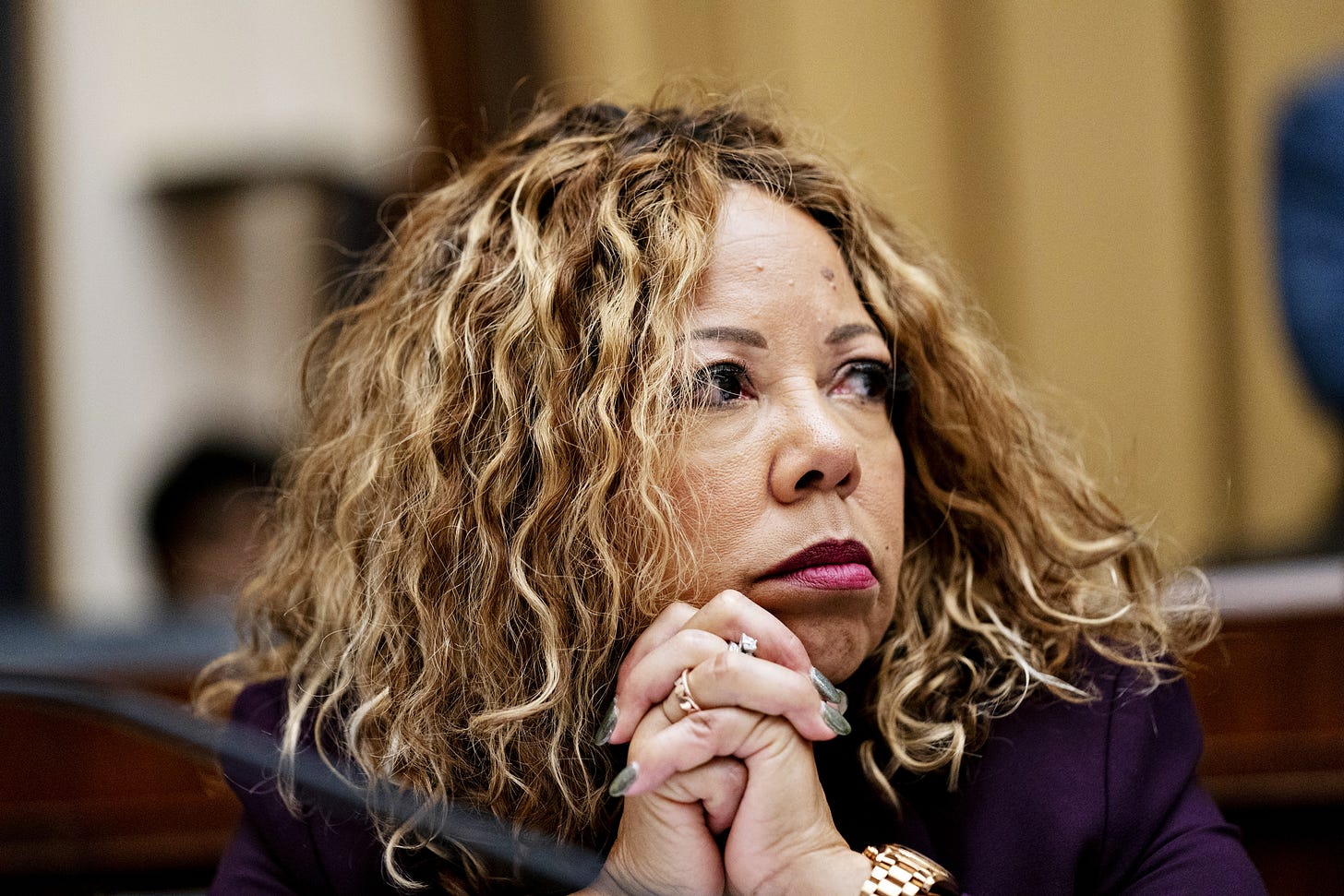New maps could cause McBath to switch districts -- again
Could reordered maps once again complicate McBath's re-election plans?
Another drastic reconfiguration of Georgia’s political maps could cause one metro Atlanta area congresswoman to run in a different district — again.
Just two years after GOP state lawmakers strongarmed her competitive suburban district, forcing her to abandon it and instead challenge a colleague on friendlier turf, Democratic U.S. Rep. Lucy McBath of Marietta could once again be at the forefront of a reworking of the state’s congressional district lines.
A retired Delta flight attendant, McBath, 63, was first elected to Congress in 2018 representing Georgia’s 6th district, a once-Republican stronghold that at the time included metro Atlanta’s immediate northern suburbs.
But after being re-elected to a second term in 2020, Rep. McBath’s district was widely seen as a sitting duck for Republican mapmakers, who were expected to use the upcoming redistricting process to try and stave off recent Democratic congressional and legislative gains.
Redistricting is a highly politicized process state lawmakers undertake at the start of every decade so that district maps accurately account for population shifts.
In late 2021 the GOP-controlled state legislature passed a new congressional map (above, right). As expected, McBath’s 6th district saw the biggest changes: its more diverse communities were swapped out to make way for whiter ones in Atlanta’s far-out northern exurbs.
McBath decried the new maps and reminded supporters of the tough challenges she had overcome before: she rose to political prominence in the gun control movement after her teenage son was murdered at a Jacksonville gas station. She has also survived two battles with breast cancer.
But the congresswoman was now faced with an unfortunate new political reality.
The 6th district, which was once a stomping ground of Georgia Republican heavyweights like Johnny Isakson and Newt Gingrich, had started to gravitate towards the Democratic column as the party made major gains with suburban and college-educated voters, two key voting groups that for several years had helped propel Republican candidates to statewide victories in Georgia.
But the new 6th district was so heavily Republican that former President Donald Trump would have walked away with roughly 57 percent of the vote there had it existed in 2020.
Ultimately McBath decided to run for the neighboring 7th district in Gwinnett County, which Republican lawmakers had morphed into a liberal stronghold as somewhat of a consolation prize for the minority party. In the Democratic primary, McBath easily defeated fellow newcomer U.S. Rep. Carolyn Bourdeaux in what was a rare and awkward faceoff between two incumbents en route to an easy general election victory.
Addressing residency concerns, McBath, whose Marietta home is roughly 30 miles away from District 7, had said during the campaign that she would move to Gwinnett County after winning the primary. She never did — in fact, she continues to live and vote in Cobb County. (Members of Congress are only required to live in the state they are seeking to represent, not the district.)
Now, just two years later, McBath could once again find herself in the crosshairs of a redrawn political map.
Arguments recently concluded in a federal lawsuit alleging that Georgia’s congressional and legislative maps are discriminatory towards Black voters. Some plaintiffs say that Republican legislators used the redistricting process to unfairly target McBath, who is Black, by exiling the more diverse communities in her district in exchange for whiter ones.
Others argue that Georgia’s population growth has been fueled by African Americans and that they deserve to have more districts where they comprise voting-age majorities. Experts say that this would allow Black voters to properly elect candidates of their choosing.
The state believes that race is no longer an accurate metric to use when predicting voting patterns, pointing not only to McBath’s election victories but at one time arguing that last year’s U.S. Senate contest between Democrat Raphael Warnock and Republican Herschel Walker, who are both Black men, is proof that race no longer divides electoral politics.
But the state’s lawyers did seem to concede that Black voters still overwhelmingly support Democratic candidates and that white voters support Republican candidates “to a lesser extent.”
U.S. District Judge Steve Jones is set to rule on the case in the coming weeks, and he has sympathized with many of the plaintiffs’ arguments in his previous writings. Furthermore, civil rights groups believe that last summer’s surprise decision from the U.S. Supreme Court that upheld a key part of the historic but precarious 1965 Voting Rights Act is giving lawsuits like this one and others new life.
If Jones strikes down Georgia’s congressional map, it could once again lead to the 6th district being significantly redrawn — which could again complicate McBath’s re-election plans.
Many of the maps proposed by the plaintiffs (above, right) anchor the 6th district in Atlanta’s western suburbs, making it both majority-Black and heavily Democratic.
There is a lot of uncertainty surrounding who might draw a new map. Judge Jones might give the legislature a chance to draw new maps in accordance with federal law. There’s also a possibility he might refer the entire case to an outside expert given how close we are to election season.
But if a new map ends up resembling what the plaintiffs have put forward, McBath’s allies believe she could easily switch back to District 6 since she still lives in Cobb County.
Erick Allen, a Cobb County Democratic insider, says that another McBath district jump would start a “ripple effect.”
“Only time will tell how deep the game of musical chairs will go,” said Allen.
As we have discussed before, we are starting to see the race for District 6 take shape. Republican U.S. Rep. Rich McCormick, who easily recaptured the seat for his party following the remap, is warning supporters that his Democratic opponents are “pulling out all the stops” to defeat him, an indication that he is well aware of the threats these lawsuits could pose to his re-election chances.
And Cobb County Commissioner Jerica Richardson, a Democrat, isn’t waiting for maps to be finalized to kick off her run for the 6th District. Richardson, who is no stranger to redistricting legal disputes, has said she is committed to running for Congress no matter what the lines end up looking like.
There are pros and cons to McBath switching districts again. Her allies are probably right — McBath’s relationship with President Joe Biden, combined with her connections to deep-pocketed national Democratic donors, would give her an inside track to the Democratic nomination in her own backyard. But she could again face attacks from rivals who say she is putting political convenience over representing Georgians, just as they did when she switched districts last time.
And what about District 7?
If McBath moves back to the 6th, she would be leaving behind a wide-open Democratic primary in one of the most diverse counties in the country. Gwinnett’s diverse population can be seen no further than the list of potential candidates for District 7 if McBath moves.
Bourdeaux, a former state budget director who has returned to academia since leaving Congress after just one term, could explore a comeback bid if the 7th opens up, Politico reports.
A prolific fundraiser, Bourdeaux, 53, was the only Democrat to flip a competitive district in 2020. But the ex-Georgia State University professor, who is white, lost last year’s primary thanks in no small part to Gwinnett’s diverse population, an obstacle she will surely face again if she runs. She also angered some Democrats when she was in Congress for opposing key parts of President Biden’s economic agenda.
County Commissioner Kirkland Carden is another option, according to the AJC. Carden got his start in politics in 2017 when he was elected to the Duluth City Council at just 29 years old. He has been a staunch advocate for affordable housing and transit expansion.
State lawmakers, both current and former, will surely explore a run. State Rep. Michelle Au (D-Johns Creek), the first Chinese-American woman to serve in the Georgia legislature, is one name that has been mentioned.
State Sen. Nabilah Islam (D-Duluth) is another possibility. The daughter of Bangladeshi immigrants, Islam was narrowly elected to the state senate last year after waging an unsuccessful run for Congress in 2020. She has aligned herself closely with the party’s more progressive wing and was a huge supporter of McBath’s when the latter switched to run for District 7.
Former State Rep. Donna McLeod might give an open race a try. McLeod, who is Jamaican-American, ran for the seat in 2022 but was boxed out by two well-financed incumbents, an issue she will not have if McBath switches districts.
Many key questions in this unprecedented redistricting drama will remain unanswered until (and in some instances, when) Judge Jones issues his ruling. But preparations are already underway for a reordering of the state’s political maps: candidates are working behind the scenes to line up endorsements, make fundraising appeals, and — yes, even launch campaigns.
State lawmakers are said to be rethinking their holiday travel plans, a sign that they expect to be called back to Atlanta later this fall for a special redistricting session at the Gold Dome.
“I’m not booking any flights in November,” says one lawmaker. “Or early December.”
EDITOR’S NOTE: This story has been updated to correct the spelling for former Rep. Carolyn Bourdeaux’s name.





